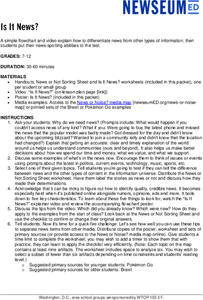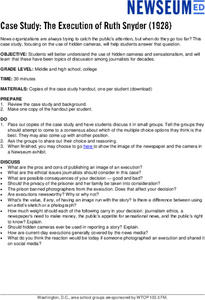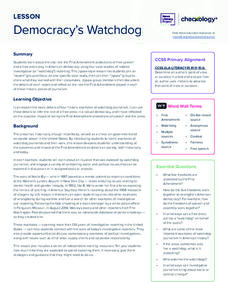Pulitzer Center
The Paradise Papers: A Lesson in Investigative Journalism
The Paradise Papers, a year-long research project from the International Consortium of Investigative Journalism (ICIJ) exposed how political leaders, business people, and wealthy individuals used offshore entities to avoid taxes and hide...
Pulitzer Center
Facing Risk: Journalists and their Families
Facing Risk is a powerful film that urges journalists who are committed to reporting from the world's hotspots to engage in difficult but essential conversations with their families before leaving on assignment. Interviews with kidnapped...
Facing History and Ourselves
Citizen Watchdogs and the News
To conclude their case study of media coverage of the shooting of Michael Brown by a Ferguson, Missouri, police officer, class members consider the role of citizen watchdogs in a democratic society, develop strategies for combating...
Facing History and Ourselves
Hands Up, Don't Shoot!
Why is it so difficult to develop a clear understanding of the events surrounding the shooting of Michael Brown by a Ferguson, Missouri, police officer? To answer this question class members listen to a NPR discussion of the findings of...
Facing History and Ourselves
The Importance of a Free Press
"Congress shall make no law . . . abridging the freedom of speech, or of the press;. . ." Why is this guarantee of free speech and a free press the First Amendment to the US Constitution? Why are these rights so essential to a democracy?...
Facing History and Ourselves
#IfTheyGunnedMeDown
As part of their continued investigation of the reporting of the shooting of Michael Brown class members analyze photos of Michael Brown and the social media response to these images. The class then develops a guide they believe news...
Facing History and Ourselves
The Power of Images
One picture but a thousand stories. As a part of a case study of how the death of Michael Brown was reported by professional news sources and on social media class members examine the reactions of various groups to a photograph taken by...
Facing History and Ourselves
Social Media and Ferguson
How can social media help or hinder civil dialogue? How can information shared on social media be verified? As the investigation of media reports of the events surrounding the shooting of Michael Brown continues, class members read news...
Facing History and Ourselves
Verifying Breaking News
The attempts of journalists to verify the events surrounding the shooting of Michael Brown take center stage as individuals analyze three of the initial newspaper accounts of the story. The whole class discussion then focuses on the...
Newseum
You Can’t Say That: Right to Know vs. Security Risk
Print or block? That is the question young journalists debate as part of their study of the freedom of the press. Half the class represents the journalists' legal team, and the other half represents the government's legal team. Teams...
Newseum
Is It Fair?
Young journalists learn how to analyze word choice, context, and counterpoints to judge the fairness of a news story. They practice using these tools to judge a series of headlines for the story of Goldilocks and the Three Bears. They...
National Woman's History Museum
Ida B. Wells: Suffragist and Anti-Lynching Activist
Suffragette, investigative journalist, and civil rights activist Ida B. Wells is the focus of a lesson that has young historians study the work of this amazing woman. Scholars watch a video biography of Wells, read the text of her speech...
Facebook
Metadata
In previous lessons, young journalists learned about how to trace the original source of scrapes and memes. This interactive lesson plan teaches them another important step in the verification process. Participants learn how to analyze...
Facebook
Versions of Media Texts
Verification of provenance and the original source of an image or video can be a long and winding process. Young journalists learn about the difficulty of finding the original source of a scrape, a copy of an original news story, and...
Newseum
When Tragedy Hits — Role-Playing a Breaking News Story
Young journalists engage in a role-playing exercise that asks them to consider the journalism and ethical issues raised by the coverage of the mass shootings at Virginia Tech on April 16, 2007. Pupils play the role of either a reporter...
Newseum
Covering a Catastrophe: Evaluating Disaster News
Young journalists investigate the various ways to share news about a disaster and evaluate the pros and cons of each of these types of news. Individuals then select two different forms of media reports of a recent disaster. Using the...
Newseum
Is It News?
Is it news or not? That is the question young journalists must consider in a lesson plan about newsworthiness. Class members watch a short video that details five key characteristics of quality, credible news. Individuals then use these...
Newseum
Reporting Part III: Staying Objective
The third and final lesson in the Reporting series tests young journalists' ability to be objective in reporting contentious topics. After brainstorming a list of contentious topics that interest them, the class selects one, and...
Newseum
Reporting Part II: Beyond the Basics
Scholars examine the articles written for the series' first activity and select ones that would benefit from further research. In a 48-hour deadline, teams of three select one topic to investigate in greater depth and craft a revised...
Newseum
The Making of Fake News: A Case Study
"Fake News" (stories that are entirely fabricated/fictional) is the subject of a case study of the search for Jestin Coler, the creator of some of the most famous fake news stories. After reading NPR's investigative report, scholars...
Newseum
Case Study: The Execution of Ruth Snyder (1928)
The case of the 1928 execution of Ruth Snyder takes center stage in a lesson that asks young journalists to consider the ethics involved in publishing an image of an execution. A series of discussion questions ask individuals how they...
News Literacy Project
News Goggles: Conflicts of Interest in News Reports
Nineteen slides use the story of Chris Cuomo of CNN and his refusal to discuss his brother, New York governor Andrew's political troubles, to inform viewers about the idea of conflict of interest in journalism.
News Literacy Project
News Goggles: Tracking Developing Stories
A 28-slide presentation introduces viewers to the process reports go through to track and verify developing news stories. Using the reports of the attacks at Atlanta, Georgia, massage parlors as an example, viewers are taught what to...
News Literacy Project
Democracy’s Watchdog
As part of a study of the importance of the First Amendment, expert groups research different historic case studies of investigative reporting, and then the experts share their findings with jigsaw groups. The case studies include Nellie...

























